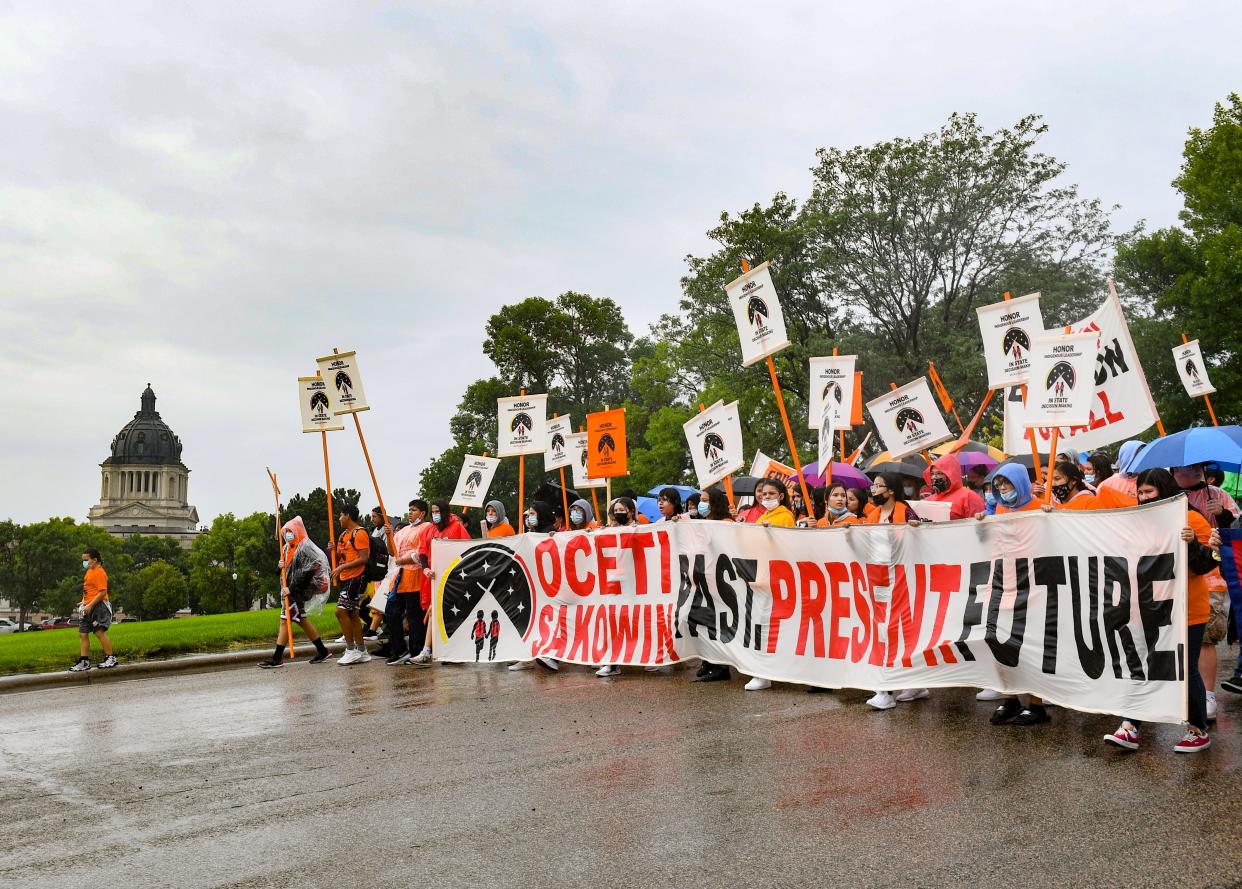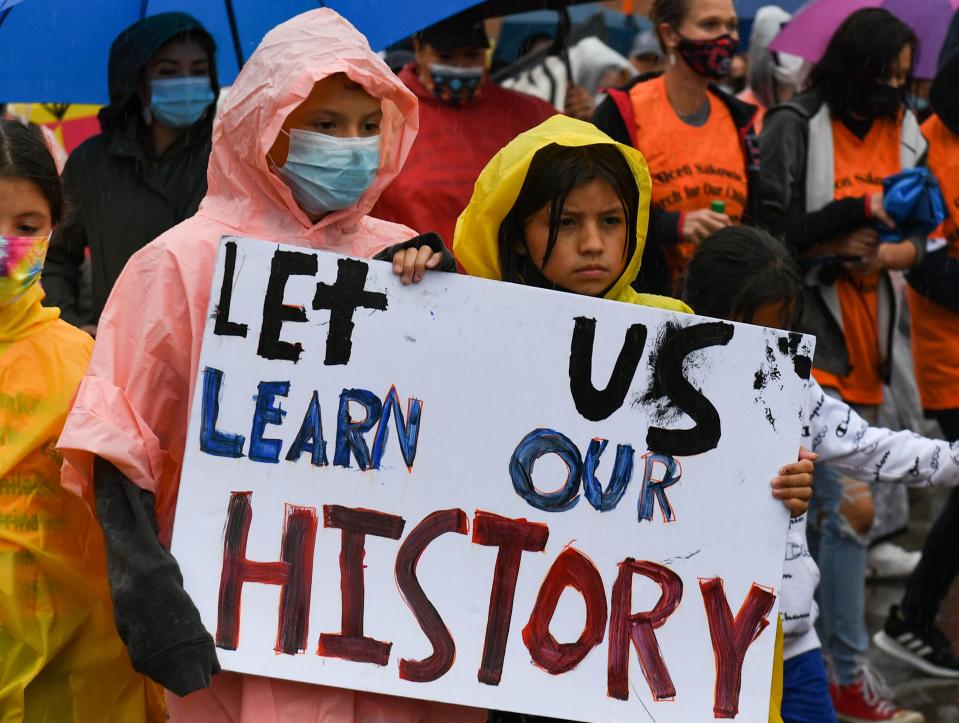South Dakota will go another year without requiring certain Indigenous education lessons for schools

The House Education committee voted to kill a bill that would have made the Board of Education Standards promulgate rules on curriculum and coursework on Oceti Sakowin Essential Understandings.
OSEU standards have been agreed upon by the state's nine federally recognized tribes. The standards give a chance for students to focus on the heritage and history of the tribes and the Oceti Sakowin, or the Seven Council Fires, people Indigenous to this area.
According to the most recent survey by the Department of Education, only 45% of teachers are teaching required standards on OSEUs, which are basic understandings of Lakota, Dakota and Nakota culture and history.
Standards were approved by the Board of Education Standards in 2018, and curriculum teaching to those standards were created by educators, elders, tribal officials and DOE representatives across the state. That board approval should make the standards required for all K-12 students, but DOE officials in the past have said they’re unsure how broadly OSEUs are used, and that they weren’t required.
More: South Dakota DOE removed Indigenous topics from social studies standards before final draft
A similar bill to HB 1170 was shot down in the 2021 session, too.

Inclusion of Oceti Sakowin culture and history in standards became a hot topic last summer and at the start of the fall after the DOE had stripped more than a dozen references to the Oceti Sakowin from a draft of proposed social studies standards before it was released to the public.
More: Oceti Sakowin March for Our Children demands Indigenous history education for all of South Dakota
The DOE's revision was called erasure by Indigenous people across the state, and sparked protests in Pierre calling for resignations of major government officials behind the decision. Gov. Kristi Noem later called for the social studies standards process to be relaunched.
'When in doubt, I vote no'
At the start of the hearing for HB 1170, lawmakers passed amendments to clarify that this would not require changes to social studies standards, and the explicit inclusion of OSEUs in social studies standards.
Rep. Peri Pourier, the Democrat from Pine Ridge who brought the bill, said the DOE's change to social studies standards was interpreted by many as an attack on Indigenous people. No solution is perfect, she said, but the bill would be a first step.

Further proponents for the change included Sarah White, a leader for the South Dakota Education Equity Coalition, an organizer with the Pierre protest; a teacher; Cante Heart; Deborah Bordeaux; Dr. Sherry Johnson, a member of the social studies standards revision workgroup and the tribal education director for the Sisseton Wahpeton Oyate; a parent from Butte County.
More: Educators address legislative future of Indigenous inclusion, resilience in South Dakota schools
White said implementation of OSEUs is urgent, and said it could help with the underperformance of Native students across the state, including in Sioux Falls and Rapid City. Culturally relevant education helps students' performance in school, she said.
Johnson said with the DOE's changing of the standards, she felt disappointed, excluded and let down, but feels hope with this bill, which could give students a well-rounded education.
The sole opponent was Rob Monson with the School Administrators of South Dakota, who said he doesn't oppose the Oceti Sakowin Essential Understandings, but said the bill was unnecessary because teaching of OSEUs is already current practice.

His argument could be refuted by the DOE's survey results, which show OSEUs aren't used in every South Dakota school and that students aren't tested to these standards.
More: Less than half of South Dakota's teachers using Oceti Sakowin Essential Understandings
While the DOE’s survey isn’t comprehensive – 125 of the state’s 149 public school districts participated in the survey, which saw 718 total respondents – it shows implementation of OSEUs is occurring in small, isolated efforts that lack systemic support and dedicated time.
Half of all educators responded that OSEUs were used with some frequency during the school year, but 50% of educators and 65% of administrators cited unfamiliarity with resources as a challenge for implementation.

In committee on Wednesday morning, lawmakers asked questions about the difference between standards and curriculum, and the difference between "South Dakota American Indian history and culture" as already included in statute, and the bill that points to specifically "Oceti Sakowin Essential Understandings."
More: ACLU argues Noem, DOE 'likely' break laws by removing Oceti Sakowin from social studies standards
Rep. Jennifer Keintz motioned to send the bill to the House with a recommendation it pass, but her motion failed 7-8.
Rep. Fred Deutsch then motioned to move the bill to the 41st day, effectively killing it. He said, "When in doubt, I vote no."
Deutsch, along with Reps. Drew Dennert, Phil Jensen, Sam Marty, Scott Odenbach, Bethany Soye, Sue Peterson and Lana Greenfield all voted against the motion to pass the bill, and for the motion to kill the bill.
This article originally appeared on Sioux Falls Argus Leader: South Dakota House kills bill on Indigenous education in schools
